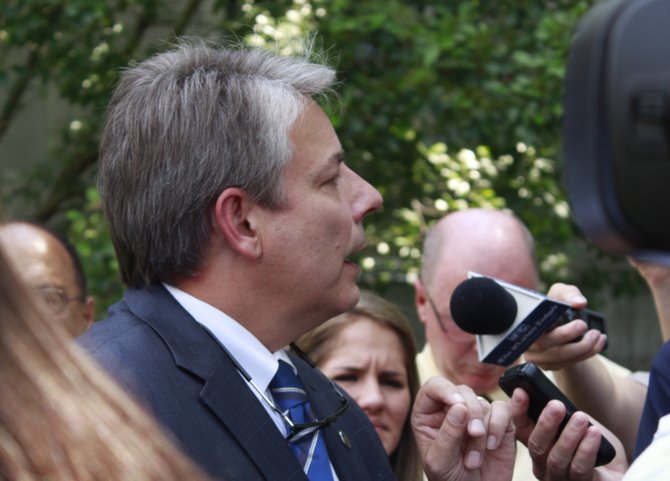Attorney Mitch Tyner speaks at a press briefing about possible voter fraud in the Cochran-McDaniel Senate race. Photo by Amber Helsel
JACKSON — At a 3 p.m. press conference on the Hinds County Courthouse lawn, the local counsel for the Chris McDaniel U.S. senatorial campaign said he is confident that enough fraudulent votes were cast to swing the outcome of the June 24 Republican primary run-off.
“We don’t have to have 6,700 (ineligible votes to challenge the election); however, I would be surprised if we don’t find 6,700," Tyner said. He did not offer a specific number, but said the campaign has found "thousands" so far, although no specific number is required to file a challenge.
Tyner sent the campaign's gratitude to "over 50 counties that bent over backwards … to help us gather information on eligible voters," indicating that not all counties were so helpful to the effort to ensure Cochran won fairly and squarely. He said the campaign has examined contents of ballot boxes in upwards of 70 of the state's 82 counties so far. Last week, McDaniel offered a $1,000 reward for information about fraudulent voting.
“It is imperative that an ineligible voter not be excluded from this because when I vote and there’s an ineligible voter that also votes, he dilutes my vote. He dilutes your vote,” Tyner told reporters. Tyner said in an interview after the press conference that other allegations of fraudulent voting practices, like the exchange of money for votes, have been reported to authorities.
The Jackson-based attorney isn't a stranger to tough Mississippi politics.
Tyner ran against Haley Barbour in the 2003 Republican gubernatorial primary—a move many believed was a political trick by the Democrats so that Tyner could wage a tougher campaign against Barbour than incumbent Democratic Gov. Ronnie Musgrove could. During the campaign, the Barbour camp sent out a missive calling his opponent the "Liberal Trial Lawyer and Democrat-Lover Mitch Tyner."
In a later interview, Mississippi Democratic Party Chairman Rickey Cole dismissed the notion that his party had put Tyner up to run against Barbour in 2003. "Mitch has as good a Republican pedigree as any of the Barbours do."
Tyner, who donated $300 to the Republican Party in 2012, said the McDaniel campaign is viewing the contents of all ballot boxes at every courthouse to determine how many ineligible voters voted in the runoff to help tip the scales toward incumbent Sen. Thad Cochran. The only registered voters in the state who were ineligible under Mississippi state law are those who voted in the June 3 Democratic primary, then showed up for the June 24 Republican run-off.
The review includes all absentee applications and envelopes that the absentee ballots arrived in.
Tyner handed out language from a 1954 Mississippi Supreme Court decision, Sartin v. Barlow, that established the right of political candidates to review election materials, including ballot boxes and their contents, to discover "any wrong or fraud or thievery" of votes.
Once the ballot review is complete, Tyner said, the campaign would likely file a challenge with the state GOP party, then 10 days later, an appeal for judicial review of the election. To date, McDaniel has refused to concede the election, based on accusations of inappropriate crossover voting, as well as alleged vote-buying by mainstream Republican operatives, working with at least one Democratic operative.
"We're following up all leads," Tyner said, in order to protect the integrity of the vote. He added that he was surprised "at the amount of irregularities" they had found already.
Tyner did not miss an opportunity to knock the intense campaign that the state Republican establishment, including Secretary of State Delbert Hosemann, waged to bring voter ID to Mississippi—especially compared to the higher risk of fraud involved with absentee voting.
“I believe it was (Hattiesburg) Mayor (Johnny) DuPree who said, ‘There is no way that voter ID is going to stop much fraud in Mississippi.’ In fact, he said, ‘If you want to stop fraud in Mississippi, you need to get on top of absentee ballots,'” Tyner said.
As the press conference unfolded, the campaign for Sen. Thad Cochran sent out a statement countering McDaniel's efforts.
" We have representatives at all 82 courthouses today to monitor the review of ballot boxes and have been pleased with the results," the email read.
"The county-by-county results reported thus far are revealing an extremely low number of crossover votes from the June 24th election. As the process moves forward, the conversation is shifting from wild, baseless accusations to hard facts."
The Cochran campaign machine is also under separate federal scrutiny. Last week, the Federal Election Commission indicated that a Barbour-promoted PAC to help Cochran, Mississippi Conservatives, might have failed to file required 24-hour reports detailing "last minute" independent expenditures. The PAC has until Aug. 1 to provide documentation to the FEC.
Even though some state Democratic voters turned out for Cochran in the run-off after a last-minute push to woo them to the polls, many in the party are behind McDaniel's push to review the election. “This election has already provided more than its share of tragic and bizarre stories. Now, the specter of election fraud has been raised," former state Rep. Brandon Jones wrote in a statement last week. Jones is now the director of the Mississippi Democratic Trust.
Jones continued: "The citizens of this state were sold a package of voting laws by leaders who told us that their main concern was election integrity. These leaders, like Secretary of State Hosemann, now have an opportunity to show that all the talk about protecting the vote wasn't politics as usual. Because election integrity laws should never be enforced selectively based on party, we call on Secretary Hosemann and local law enforcement officials to treat these allegations with the seriousness they deserve."




Comments